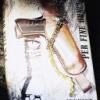01. Blunt Instrument Bond (1953-1956)
Fleming's original conception of Bond, the relatively characterless government assassin: the man who must always be a silhouette.
In Casino Royale Bond could almost be a figure out of the hardboiled noir genre, either the American tradition of Chandler and Hammett or the continental corpus exemplified by Peter Cheyney and Georges Simenon. He is a hard, tough man who kills because it's his job. In Casino Royale he almost threatens to turn into a human being, thanks to LeChiffre and Vesper, but the perfidy of Smersh convinces him to remain a "wonderful machine."
The wonderful machine is the figure who stars in Live and Let Die, Moonraker, and Diamonds Are Forever, all carefully-controlled, often procedural and mostly down-to-earth books. He is the consummate professional and as a character is intentionally kept flat. This is the humorless Bond that people often compare his film incarnation to. But when he falls in love with Tiffany Case (perhaps Fleming's best female character), he threatens to become human again. This leads to...
02. Almost Human Bond (1957-1961)
After the slack of DAF, Fleming decided to better his previous books with From Russia With Love. The book demanded a more rounded Bond, and Fleming was forced to delve deeper into his hero. We're told exactly what Bond looks like and given bits of his past history. In MR Fleming had given us the details of Bond's "everyday" life in London. Now we're given a fuller profile--Bond reminisces about his youth, worries that he's "pimping for England," experiences fear when his airplane's caught in a storm, etc. Because FRWL revolves entirely around a deathtrap for one man, it's important that this man be someone the reader can empathize with; he must be a recognizable human being. This Bond even has a distaste for cold-blooded killing greater than that of Instrument Bond.
FRWL exhausted Fleming with its realism and relatively tight plotting. He'd literally left the character for dead. Both Bond and Fleming recuperated with a ripping adventure story. With Doctor No Fleming hurled Bond into an overripe modernist homage to Fu Manchu. Having established a less brutal and more human, relaxed and approachable Bond to ground his narratives, Fleming could now pit him against giant squid, a "dragon" and a villain cut directly from the cloth of pulp fiction.
With Goldfinger Fleming, comfortable with his routine, plunged into full-blown self-parody. The book was a self-pastiche (much as the movie versions of YOLT and TSWLM are pastiches of the movies that preceded them) that ventured into the most fantastic realms of any Bond yet, thanks to the Fort Knox plot and characters such as Oddjob and Pussy Galore. Against all this outrageousness and implausibility, it was important for Bond to be a grounded character with a sense of the absurd. GF marks the point where Bond truly develops a sense of sardonic humor, all the better to help him cope with the fantastic adventures and people he encounters. The book is also notable because Fleming uses more free indirect speech than ever before, which puts us inside Bond's head. We get an intimate look at Bond's increasing unease with killing (the Bond of CR would have dismissed such feelings as vin triste) and are treated to his mental quotations of St.Augustine and so forth.
Fleming had arrived at an irony: his books had become more self-parodic while his hero's character has gained in depth. The stories collected in For Your Eyes Only, due to their often experimental nature, delve further into Bond's humanity. In FYEO he feels guilt about being M's hitman; in The Hildebrand Rarity Bond's love for nature is further explored; in Quantum of Solace Bond repudiates his job in empathy with the everyday "comedie humaine" of human relations.
03. Suffering Bond (1961-1964)
By the time of FYEO Bond was no longer a wonderful machine. He was not quite a fully-dimensional, complex human being--Bond wouldn't have worked as one, being a male-fantasy projection and figure for reader identification--but he was more human than ever before. Why? Because Ian Fleming failed.
Let's allow Fleming to explain:
Now, you’ll notice that the James Bond of the first book was a straightforward man who didn’t really possess a total personality. In fact, in the first several books you’ll find absolutely no discussion of his character, few of his mannerisms, no character study in depth...I kept him quite blank, in a way, at first, giving him no quirks, no particular morality or immorality, not even a definite detailed personal appearance. As the series has gone on, however, James Bond has become encrusted with mannerisms and belongings and individual characteristics. This is probably a natural outgrowth of getting to know him better. I don’t know if this is good or bad, and I don’t know where all the elements that compose Bond come from, but there they are...As to quirks and tastes, likes and dislikes, bits of me probably creep in. But not important bits.
Fleming was being slightly disingenuous--important bits did creep in. In the first place, Fleming began sharing his health problems with his creation, as demonstrated in Thunderball, where Bond's body has begun showing serious strain for the first time. The book begins in a sanitarium and ends in a hospital. This is the beginning of Suffering Bond, a man battered by life and clearly showing it. It is also the beginning what we could call Loving Bond--from here on Bond's relations with women deepen and grow more meaningful. He falls in love with Domino, Tracy and Kissy, all of whom register as vivid characters (the first and last rival Tiffany, and Kissy may be the strongest Bond girl of them all). These are not light-hearted affairs, and in many respects they are dream fulfillments likely inspired by Fleming's now increasingly unhappy marriage.
After the strain (on author and character) of TB, Fleming made a dramatic right turn with The Spy Who Loved Me. Bond shows up as a knight in shining armor, but a humanly fallible one: he's almost squeamish about killing Sluggsy and Horror in cold blood and at times looks borderline incompetent. Having begun exploring his health problems in his books, Fleming now began inserting bits of disguised autobiography: Vivienne Michel's loss of virginity was based on Fleming's own first time (as noted by Andrew Lycett in his biography)--it isn't a stretch to see the callow, upper-class Derek as a veiled self-portrait of Fleming as a young man, penned by an older man now looking back ruefully on his treatment of women. After all, that is what The Spy Who Loved Me is really about: the mistreatment of women. A bright, intelligent young girl is disgracefully treated by a host of men from all sorts of backgrounds and nationalities, and the only decent man in the book is a completely unattainable one. This makes TSWLM even more devastating as a lament for the plight of women. One wonders why feminist critics have not given this rich and curious novel further attention.
Most of the critical attention it did get was uncomprehending, and the failure of TSWLM must have badly hurt Fleming. He retreated to a more conventional format but even then experimented: in On Her Majesty's Secret Service Bond falls in love and marries. This is the fullest portrait of Loving Bond, Bond as Caregiver, the man attracted to birds with a wing down who he feels the need to protect. (By now he's older and tired of messy affairs.) As in CR, he feels the call to put aside his career and settle down to marriage. But whereas SMERSH gave Bond a concept to fight against that helped him recover from Vesper's death, his guilt over not being able to protect Tracy almost destroys him.
In You Only Live Twice we find the apotheosis of Suffering Bond. In the beginning of the book he's been reduced to an helpless wreck. (When he wonders about where dead insects go he's touchingly human.) If misery demands company, Fleming demanded that Bond share it with him. That's not all that gets shared: in YOLT he demonstrates a greater sense of humor than ever before. Some have seen this as the influence of the movies, but that seems unlikely: the sardonic wisecracks of YOLT are different from the punning one-liners of the films. It's more likely that Fleming, after having given Bond his health problems and gloom, also gave Bond his sense of humor--it's of the sort Fleming repeatedly demonstrated in his letters. After a decade of living with Bond, Fleming had begun merging him with his own character (and other characters too--Dexter Smythe in Octopussy is another veiled self-portrait, one of Fleming gone to seed).
The ultimate end to Suffering Bond would have been death, but it was Bond who killed Fleming, not the other way around. Instead YOLT chronicles Bond's spiritual and near physical death and rebirth. He loses his memories and even his sex drive(!) and attains a short-lived happiness as a Japanese fisherman. It's rather a pity that he couldn't have stayed that way. James Bond had come to the end of his natural life and died, and out of his corpse emerged Taro--for a while anyway. Eventually the dying Fleming dragged himself to his typewriter and tried to feed the beast one more time.
The Man With the Golden Gun was nothing less than a reboot of the entire series. Introduced as a zombie, Bond regains life as a near-blank slate. Once a wonderful machine, and then a human being, Bond is now a broken-down machine trying to start up again. Practically the only human quality he exhibits is his complete inability to kill in cold blood--his final scene with Scaramanga is rather piquant. Had Fleming been in better health he might have gone further with the idea of Bond having totally lost his killer instinct, the quality that made him a Double O. (The Bond of Casino Royale would have been disgusted with how bad he'd become at his job.) Alas, Fleming had run out of zest and time. TMWTGG ends with the promise of the bland Bond, a man without a past or personality, poised for further inconsequential adventures with more cardboard women. And so Fleming ceded his character to the movies. It was the end of an age, and James Bond would not have a fourth.
Edited by Revelator, 18 November 2008 - 12:47 AM.









